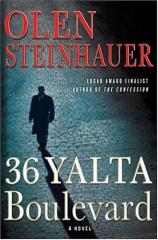36 Yalta Boulevard
Review
36 Yalta Boulevard
In only his third novel, author Olen Steinhauer brings to mind the
baroque, highly complicated and yet spare plots of the master, John
le Carre. In the depths of the paranoid cold war, everyone seemed
to be spying on everyone else and no one, not even your co-workers,
were to be trusted. In an unnamed eastern European republic that
borders mythically on Hungary (where Steinhauer lives) and that
seems familiar, spying, death, traitors and deception are
everyday occurrences. You don't know who to trust, and if you're
part of the mechanism, you simply know that your every move is
watched, your every action monitored --- for your safety, of
course, the safety of the state.
Brano Sev made the mistake of being a smart spy and standing in the
way of his more ambitious colleague. A year after he gets in his
colleague's way, he's been drummed out of the ranks and is working
on a factory line. His old mentor comes to him and unofficially
pulls him out to go to his home village and try to figure out why
Jan Soroka disappeared for several months. He claimed to have found
a woman --- was that the truth?
Sev, who years ago sent his own father into exile rather than see
him in prison, is soon framed for a murder in his hometown. He ends
up across the border in Vienna, apparently defecting or in exile,
but in truth spying again. It's sometimes hard to know who he's
working for, since even the good guys are torturers and use threats
and pain to evoke cooperation. But he's alive. And the woman he
cares about is back in his life. Is it love? Can love happen in
such a dismal world? Brano Sev does not seem the type to be
lighthearted and happy in love.
As a reviewer, I'm aware of the pitfalls of comparing authors, and
I don't do it lightly; as a reader, I'm often dismayed when I read
recommendations that say "if you like X, you'll like Y" because the
comparisons are often based on superficial values of X and Y ---
books set in the same place, authors who happen to be female, or
male. Big deal.
But my comparison of Steinhauer to le Carre comes from an
appreciation of both authors' ability to show a distinctly
non-glamorous everyday espionage, devoid of ringing heartfelt
flag-waving or patriotism. It's just a job, it seems, and while the
few actual bits of "tradecraft" I read were rare but intriguing and
interesting (although mundane tiresome business to the actual spy),
this was a book about ugly politics, about getting things done by
hurting people, by betrayal, in the name of ambition and, yes,
perhaps some ideals. And le Carre's plots, which inevitably leave
me confused but still involved, are rather Byzantine and I usually
just wait until the end of the book where, I hope, all is
explained. Often, however, the reader is left puzzled.
So I felt with 36 YALTA BOULEVARD, where things keep turning and
twisting. I was never sure if Sev knew what was going on; I was
pretty sure I didn't.
Reviewed by Andi Shechter (roscoe@drizzle.com) on December 22, 2010




